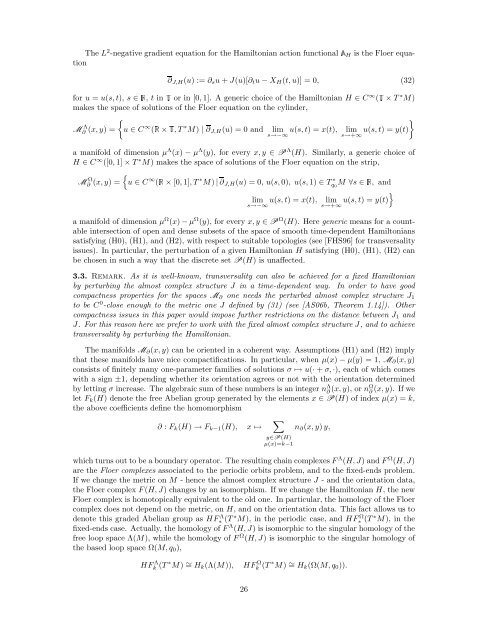Create successful ePaper yourself
Turn your PDF publications into a flip-book with our unique Google optimized e-Paper software.
The L 2 -negative gradient equation for the Hamiltonian action functional�H is the Floer equation<br />
∂J,H(u) := ∂su + J(u)[∂tu − XH(t, u)] = 0, (32)<br />
for u = u(s, t), s ∈Ê, t inÌor in [0, 1]. A generic choice of the Hamiltonian H ∈ C∞ (Ì×T ∗M) makes the space of solutions of the Floer equation on the cylinder,<br />
M Λ �<br />
∂ (x, y) = u ∈ C ∞ (Ê×Ì, T ∗ �<br />
M) | ∂J,H(u) = 0 and lim u(s, t) = x(t), lim u(s, t) = y(t)<br />
s→−∞ s→+∞<br />
a manifold of dimension µ Λ (x) − µ Λ (y), for every x, y ∈ PΛ (H). Similarly, a generic choice of<br />
H ∈ C∞ ([0, 1] × T ∗M) makes the space of solutions of the Floer equation on the strip,<br />
M Ω �<br />
∂ (x, y) = u ∈ C ∞ (Ê×[0, 1], T ∗ M) | ∂J,H(u) = 0, u(s, 0), u(s, 1) ∈ T ∗ q0M ∀s ∈Ê, and<br />
�<br />
lim u(s, t) = x(t), lim u(s, t) = y(t)<br />
s→−∞ s→+∞<br />
a manifold of dimension µ Ω (x) − µ Ω (y), for every x, y ∈ P Ω (H). Here generic means for a countable<br />
intersection of open and dense subsets of the space of smooth time-dependent Hamiltonians<br />
satisfying (H0), (H1), and (H2), with respect to suitable topologies (see [FHS96] for transversality<br />
issues). In particular, the perturbation of a given Hamiltonian H satisfying (H0), (H1), (H2) can<br />
be chosen in such a way that the discrete set P(H) is unaffected.<br />
3.3. Remark. As it is well-known, transversality can also be achieved for a fixed Hamiltonian<br />
by perturbing the almost complex structure J in a time-dependent way. In order to have good<br />
compactness properties for the spaces M∂ one needs the perturbed almost complex structure J1<br />
to be C 0 -close enough to the metric one J defined by (31) (see [AS06b, Theorem 1.14]). Other<br />
compactness issues in this paper would impose further restrictions on the distance between J1 and<br />
J. For this reason here we prefer to work with the fixed almost complex structure J, and to achieve<br />
transversality by perturbing the Hamiltonian.<br />
The manifolds M∂(x, y) can be oriented in a coherent way. Assumptions (H1) and (H2) imply<br />
that these manifolds have nice compactifications. In particular, when µ(x) − µ(y) = 1, M∂(x, y)<br />
consists of finitely many one-parameter families of solutions σ ↦→ u(· + σ, ·), each of which comes<br />
with a sign ±1, depending whether its orientation agrees or not with the orientation determined<br />
by letting σ increase. The algebraic sum of these numbers is an integer n Λ ∂ (x, y), or nΩ ∂<br />
(x, y). If we<br />
let Fk(H) denote the free Abelian group generated by the elements x ∈ P(H) of index µ(x) = k,<br />
the above coefficients define the homomorphism<br />
∂ : Fk(H) → Fk−1(H), x ↦→ �<br />
n∂(x, y)y,<br />
y∈P(H)<br />
µ(x)=k−1<br />
which turns out to be a boundary operator. The resulting chain complexes F Λ (H, J) and F Ω (H, J)<br />
are the Floer complexes associated to the periodic orbits problem, and to the fixed-ends problem.<br />
If we change the metric on M - hence the almost complex structure J - and the orientation data,<br />
the Floer complex F(H, J) changes by an isomorphism. If we change the Hamiltonian H, the new<br />
Floer complex is homotopically equivalent to the old one. In particular, the homology of the Floer<br />
complex does not depend on the metric, on H, and on the orientation data. This fact allows us to<br />
denote this graded Abelian group as HF Λ ∗ (T ∗ M), in the periodic case, and HF Ω ∗ (T ∗ M), in the<br />
fixed-ends case. Actually, the homology of F Λ (H, J) is isomorphic to the singular homology of the<br />
free loop space Λ(M), while the homology of F Ω (H, J) is isomorphic to the singular homology of<br />
the based loop space Ω(M, q0),<br />
HF Λ k (T ∗ M) ∼ = Hk(Λ(M)), HF Ω k (T ∗ M) ∼ = Hk(Ω(M, q0)).<br />
26




